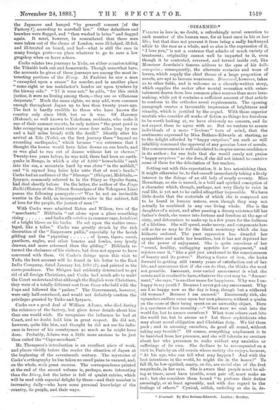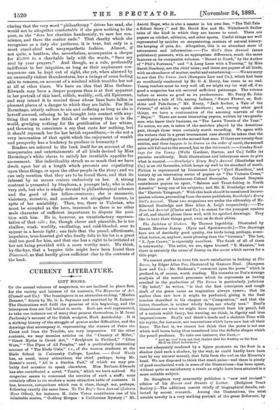• DISARMED.* PALLING in love is, no doubt, a refreshingly
novel sensation to each member of the human race, for at least once in his or her life ; but that does not prevent it from being a sadly hackneyed affair to the race as a whole, and so also is the expression of it. "I love you," is not a sentence that admits of much variety of treatment ; originality cannot well be imparted to it, even though it be contorted, reversed, and turned inside out, like Monsieur Jourdain's famous address to the eyes of his belle. nzarquise ; consequently, the alternate ecstacies and woes of lovers, which supply the chief theme of a large proportion of novels, are apt to become wearisome. Disarmed, however, takes us to other fields, and is welcome as a cleverly-written story,, which supplies the seeker after mental recreation with enter- tainment drawn from less common-place sources than mere love- making, while yet it contains a snfficient amount of that article to conform to the orthodox novel requirements. The opening paragraph creates • a favourable impression of brightness and' vivacity, which is justified by the sequel. With those superior mortals who consider all works of fiction as things too frivolous to be worth looking at, we have obviously no concern, and do not expect them to agree with us. But we venture to assure individuals of a, more " lievious " turn of mind, that the sentiments expressed by Miss Betham-Edwards at starting, as to the delight afforded by "happy surprises," are such as will infallibly command the approval of any genuine lover of novels. Her commencement is well calculated to inspire serene confidence in its author ; for one feels that she would surely not praise "happy surprises" as she does, if she did not intend to contrive some of them for the delectation of her readers.
Setting out with this expectation, it is less astonishing than it might otherwise be, to find oneself immediately taking a lively interest in the doings of an old lady of nearly seventy. Miss Hermitage, as she is named, is a bold and spirited conception of a character which, though, perhaps, not very likely to exist in real life, is yet not to be called altogether impossible. We have little doubt that the materials of which she is composed are to be found in human nature, even though they may not actually be combined in any one living whole. She is the daughter of a miser, and after passing a dreary existence till her father's death, she comes into fortune and freedom at the age of sixty, and determines to make up in a few years for the dunnese of a lifetime. She will spend, make merry, and compensate her- self as far as may be for the blank monotony which she has hitherto endured. The past repression has dwarfed her sympathies and made her heartless, but it has not deprived her of the power of enjoyment. She is quite conscious of her "sound, healthy, unflagging appetite for enjoyment," and rejoices over it, "like a girl just awakened to the consciousness of beauty and its power." Having a frame of iron, she loeks forward to getting still twenty years of satisfaction out of her life, and announces that if she can do that, she thinks she need not grumble. Incessant, ever-varied amusement is what she covets and is resolved to have, whatever the cost may be. "Amuse- ment," she says, "is another name for happiness. Why was Inn- happy in my youth ? Because I never got any amusement. Why am Pas happy now as the day is long, though but a withered old woman ? Because I am amused." Enormously rich, she squanders endless sums upon her own pleasure, without a qualm on the score of their being spent on an unworthy object. Here is a specimen of her morality :—" What were we sent into the world for, but to amuse ourselves ? What were others sent into the world for, but to amuse us ? Let those sophisticate who may about moral obligation and Christian duty. We bid them pack ; and in amusing ourselves, do good all round, without taking any trouble!" Of course, everything unpleasant is to be banished from her presence, and she will tolerate no creature about her who presumes to make evident any anxieties or sufferings of its own. She declines to be accompanied on a visit to Paris by an old cousin whose society she enjoys, because, "At his age, who can tell what may happen ? And with the best intentions in the world, he might die in the house !" To fall ill, be low-spirited, marry, or die, are social sins of the first magnitude, in her eyes. She is aware that people must be ail-
ing at times, must have trouble, must pair off, must make an end ; but she considers "them bound "to perform their duties amusingly, or at least agreeably, and with due regard to the feelings of others." Cynical, selfish, unfeeling as she is, de.
• Disarmed. By Mix' Betham-Edward!. London : Bentley.
'daring that the very word " philanthropy " drives her mad, she would not be altogether comfortable if she gave nothing to the poor, so she "does her charities handsomely, to ease her con- science, and there the matter ends." That charity which she recognises as a duty she performs, it is true, but only in a most stand-aloof and unsympathetic fashion. Almost, if not quite, a heathen, she, nevertheless, accompanies a cheque for £5,000 to a charitable lady with the words, "Save my soul by your prayers." And though, as a rule, profoundly indifferent to her iniquities, as long as their unpleasant con- sequences can be kept out of sight, she yet, when alarmed by an unusually violent thunderstorm, has a twinge of some feeling akin to remorse, on account of a misdeed which troubles her not at all at other times. We have an idea that Miss Betham- Edwards may have a deeper purpose than is at first apparent in her portrait of this hard, selfish, worldly, evil, old Epicurean, and may intend it to remind those whose lines have fallen in pleasant places of a danger to which they are liable. For Miss Hermitage, utterly callous to sin and suffering as long as she is herself amused, refusing to be brought into contact with any- thing that can make her think of the misery that is in the world, grudging nothing for the gratification of her whims, and throwing to conscience a sop that costa her nothing, lest it should reproach her for her lavish expenditure,—is she not a very incarnation of that spirit which the enjoyment of wealth and prosperity has a tendency to produce in humanity ?
Readers are referred to the hook itself for an account of the masquerades and entertainments of all kinds devised by Miss Hermitage's white slaves to satisfy her insatiable appetite for amusement. Her individuality struck us so mach that we have dwelt upon her at a length which prevents our expatiating upon these things, or upon the other people in the story; and we can only mention that they are to he found there, and that its interest by no means centres exclusively on her. A strong -contrast is presented by Stephana, a younger lady, who is also very rich, but who is wholly devoted to philanthropical schemes and the good of her fellow-creatures ; she is mesmeric, visionary, eccentric, and somehow not altogether human, in spite of her amiability. Then, too, there is Valerian, who must be accepted as the hero, inasmuch as there is no other male character of sufficient importance to dispute the posi- tion with him. He is, however, an unsatisfactory represen- tative of that role; for, though clever and plausible, he is too shallow, weak, worldly, vacillating, and cold-blooded, ever to appear in a heroic light ; one feels that the proud, affectionate, impulsive, true-hearted girl who finally falls to his lot is a great deal too good for him, and that one has a right to be irritated at her not being provided with a more worthy mate. We think, by-the-bye, that a happier title might have been found than Disarmed, as that hardly gives sufficient clue to the contents of the book.







































 Previous page
Previous page